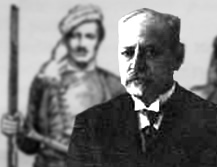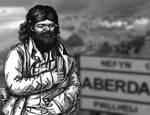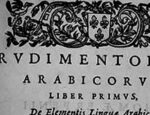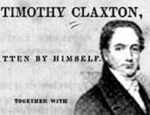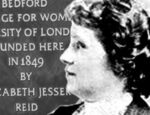Description
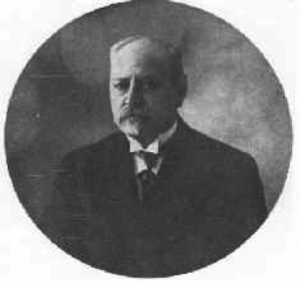 Meet Georgios N. Chatzidakis, or Hatzidakis (1848 – 1941), the freedom fighter and eminent linguist from Crete. Born in the tiny mountain village of Mirthio, into a borderline lower middlle-class family, he received only elementary schooling before joining the struggle against Ottoman rule. Despite playing a vigorous role in the Greek War of Independence, Crete had not achieved autonomy from the Ottoman Empire in the 1820s; the rights of Cretan Christians were very limited until they finally became free of Turkish rule in 1898, and they were often subjected to persecution. Chatiziidakis, aged only 18, joined his father and other rebels to fight during the Cretan Revolt of 1866-9. Thirty years later, as a Professor of Linguistics at the University of Athens, the 50-year old Chatzidakis enlisted again as a volunteer in the new Cretan uprising of 1897.After the 1866-9 revolt, which ended in defeat for the Cretan rebels, Chatzidakis completed his schooling in Athens and went on to enrol at the University of Athens, where he studied classics. A scholarship in 1877 enabled him to go to Germany to study linguistics under some of the most famous specialists of the time. It was a book written in German, Introduction to the Grammar of Modern Greek (1892), that made his name among academics.
Meet Georgios N. Chatzidakis, or Hatzidakis (1848 – 1941), the freedom fighter and eminent linguist from Crete. Born in the tiny mountain village of Mirthio, into a borderline lower middlle-class family, he received only elementary schooling before joining the struggle against Ottoman rule. Despite playing a vigorous role in the Greek War of Independence, Crete had not achieved autonomy from the Ottoman Empire in the 1820s; the rights of Cretan Christians were very limited until they finally became free of Turkish rule in 1898, and they were often subjected to persecution. Chatiziidakis, aged only 18, joined his father and other rebels to fight during the Cretan Revolt of 1866-9. Thirty years later, as a Professor of Linguistics at the University of Athens, the 50-year old Chatzidakis enlisted again as a volunteer in the new Cretan uprising of 1897.After the 1866-9 revolt, which ended in defeat for the Cretan rebels, Chatzidakis completed his schooling in Athens and went on to enrol at the University of Athens, where he studied classics. A scholarship in 1877 enabled him to go to Germany to study linguistics under some of the most famous specialists of the time. It was a book written in German, Introduction to the Grammar of Modern Greek (1892), that made his name among academics.
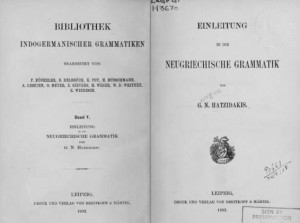 Chatzidakis became Professor of Linguistics and Indian (i.e. Sanskrit) Philology in 1890, a position he held until 1923. He was also a successful academic administrator, becoming the first President of Greece’s second university, the Aristotle University of Thessaloniki, in 1925.
Chatzidakis became Professor of Linguistics and Indian (i.e. Sanskrit) Philology in 1890, a position he held until 1923. He was also a successful academic administrator, becoming the first President of Greece’s second university, the Aristotle University of Thessaloniki, in 1925.
Chatzidakis is best known today for his contribution to the serious study of the history and morphology of the modern Greek language. He put to rest older theories that stated that modern Greek derived from the ancient Dorian and Aeolic dialects, and showed instead that modern Greek evolved from the Hellenistic koine. But the question of the future of the Greek language was politically contested. Although he opposed advocates ofthe archaïzousa, in effect an artificial form of Attic Greek promoted by extreme conservatives, Chatzidakis was a lifelong supporter of the katharévousa, the archaically tinged form of Greek used by scholars and government officials. Unlike progressive political radicals at the time, he did not approve of dhimotikí, the vernacular form of Greek spoken everyday outside of official contexts. Like so many individuals who rise socially through education, his intellectual instincts were surprisingly conservative.
n.b. around 1870

